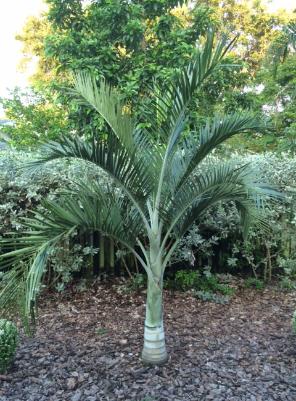Live Green, Love Green, Think Green
South Florida Landscape Plants
| Buccaneer Palm Pseudophoenix sargentii A native of the Florida Keys and the Caribbean, the buccaneer palm is notable for extremes...drought-tolerance, salt-tolerance and a growth rate slow as molasses. Buccaneer palm planted close to house Rare and unusual, no two buccaneers look alike. They can range in color from green or light green to blue green or completely silver. The swollen trunks on mature specimens vary in shape - and the subspecies saonae develops a heavier trunk than sargentii. This striking Florida native palm is not well known and used infrequently in home landscapes, but it deserves a place in warmer areas of South Florida as a focal point in tropical or coastal gardens. Since it's very slow-growing and sensitive to cold, the buccaneer is a perfect small palm to grow close to the house. The fronds' stems spread out in a flat, fan-shaped pattern, much like a tiny blue-green traveler's palm, especially while the palm is young. Mature palm Plant specs One of the most slow-growing South Florida palm trees, the buccaneer palm can eventually grow to 10 to 15 feet in Zone 10B, the recommended coolest zone for this palm. In the few existing natural stands left in Florida, some of these palms may reach 25 feet, but in a home landscape, expect only about 10 or so feet in height. Though the buccaneer does best in warmer and coastal areas, it can be grown in Zone 10A (with winter protection) in a sheltered spot in the landscape, or in a container that can be moved inside or kept in a more protected area like a pool cage. It's pest-free and very drought- and salt-tolerant, making it an ideal accent palm for warm, seaside locations. This palm can take full sun to partial shade but actually prefers some shade, especially when young. The fronds can reach anywhere from 4 to 10 feet in length; the more shade, the longer the fronds will grow. |

